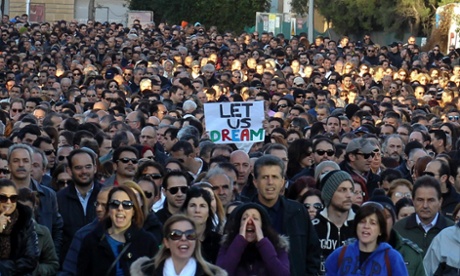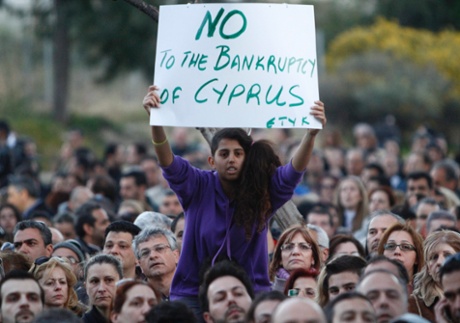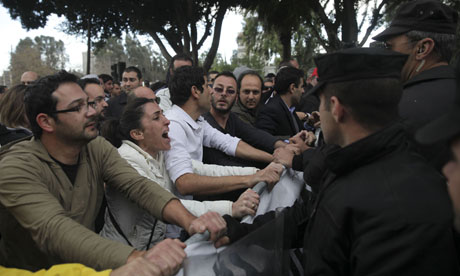http://fredw-catharsisours.blogspot.com/2013/03/cyprus-officially-passes-capital.html
( Items from Saturday at this link...... , items of the day below )
Censorship news item of the day - El Pais calls Merkel Hitler , article pulled as Spain reflects it will need German money soon , no need to piss on Merkel's leg over Cyprus ........
El Pais Retracts Article Alleging "Merkel, Like Hitler, Has Declared War On Europe"
Submitted by Tyler Durden on 03/24/2013 09:41 -0400
What does it take for the Spanish "first amendment" journalistic override to kick in? Apparently, in the case of local media leader El Pais, putting up the following in print: "Merkel, como Hitler, ha declarado la guerra al resto del continente, ahora para garantizarse su espacio vital económico." For the Spanish-challeneged this translates as follows: "Merkel, like Hitler, has declared war on the rest of the continent now to secure their economic living space." Ah yes, the touchy verboten topic of German "Lebensraum" - its invocation, and ostensibly the unflattering Merkel comparison (seen so often in Greece) were enough to get the article by Juan Torres López in the Andalusia version of El Pais titled simply enough "Alemania contra Europa" taken down.
Is it perhaps because unlike in Greece, where articles like that are a daily occurrence, Spaniards still have something to lose should they also lose the good graces of the German chancellor? Something that is more than one Spiderman towel per depositor in the nation's just as insolvent banking system, where apparently unlike in Cyprus, the ESM actually does work to preserve liquidity and stability?...
A cached version of the article:
In its place one only now sees the following:
EL PAÍS ha retirado de su web el artículo “Alemania contra Europa”, firmado por Juan Torres López y publicado en su edición de Andalucía, porque contenía afirmaciones que este periódico considera inapropiadas. EL PAÍS lamenta que un error en las tareas de supervisión haya permitido la publicación del citado material. Las opiniones expresadas por Torres López solo representan al autor.
aka:
The country has removed from its website the article "Germany against Europe", signed by Juan Torres López and published in its edition of Andalusia, because it contained statements that this paper considers inappropriate. COUNTRY regrets that an error in the monitoring tasks has allowed the publication of said material. The opinions expressed by Torres López represent only the author.
Oops, there goes freedom of expression. Of course, the full article can still be found on line, here for example.
But don't anyone dare touch Dancing with the Stars (or, in Europe, Big Brother). Then we will have problems.
Sunday news items.......
http://www.guardian.co.uk/business/2013/mar/24/eurozone-crisis-cyprus-bailout-eurogroup-meeting
Cyprus/IMF/ECB meeting over
The meeting between Nicos Anastasiades, Christine Lagarde, andMario Draghi has just ended.
Next up - the eurogroup meeting, where finance ministers will consider the issue of Cyprus's bailout again.
Noonan: Long night ahead
Back to Brussels, where Ireland's finance minister, Michael Noonan, told reporters that he is hopeful of a deal, but warned:
I'm expecting a very long night.
Noonan added that the situation in Cyprus has worsened over the last week (see 4.46pm for analysis on this)
Cyprus state television is reporting this evening that the deal to transfer the Greek-based assets of Cypriot banks to Piraeus (the Greek bank) has stalled.
This deal was announced on Friday, and is meant to protect Greek savers from the Cyprus crisis (it ringfences Greece from the threat of a deposit tax).
No further details yet, I'm afraid, but it would be a new complication to hopes of a bailout deal.
Ian Traynor, our Europe editor, has the latest details of the negotiations taking place in Brussels, including news that depositors at Bank of Cyprus with over €100,000 could lose 25% of their assets.
In the negotiations in Brussels, Anastasiades will be told that Laiki (or Cyprus Popular Bank), the country's second-biggest, must be wound down and its good assets placed with the Bank of Cyprus.But EU officials also say that Bank of Cyprus will also need to be restructured.
MPs approved legislation to restructure their banking sector late on Friday night (see Friday's liveblog).
Ian continues:
The levy on BoC deposits of more than €100,000 euros could be as high as 25% while more money will need to be raised from a tax of up to 5% on similar deposits held in other relatively healthy banks.If Anastasiades balks at this tax, already rejected by the Cypriot parliament, the alternative appears a lot worse. There would need to be a full bail-in at BoC, with depositors trading as much as 40% of deposits over €100k for bank equity.The latter takes us back to where Christine Lagarde was last weekend.
Cyprus looking to Greece
Cyprus's politicians are hoping that Greece will help fight its corner in tonight's eurogroup meting:
Dimitris Papadakis, the secretary of EDEK, Cyprus's social democrats (part of the opposition in parliament), said today that Cyprus want "substantial assistance" from Greek finance minister, Yannis Stournaras.
We need practical assistance from Greece because Eurogroup's attitude continues to be that of a blackmail, and purely anti-European.
However the views of Germany's finance minister, Wolfgang Schäuble, will carry more weight tonight - and he has already warned that Cyprus could not avoid very tough times "not because of European stubbornness, but because of a business model that no longer functions".
Archbishop of Cyprus to plead with Russians

The Archbishop of Cyprus is planning to hold talks with Russian investors later this week in an effort to stop them fleeing the country, according to Greece's Kathimerini today.
Archbishop Chrysostomos is hoping to remind them how they've benefited through their time in Cyprus:
The leader of the Church of Cyprus said after the Sunday mass in Nicosia that on Thursday he is going to host a dinner with the chiefs of Russian companies that are active in Cyprus to convince them against taking their money away from the island so that the situation does not deteriorate further.He added that he intends to remind them that their capital has for a long time been growing through interest, they have benefitted from their presence in Cyprus and that had they gone to another country the interest they would have got would have been just above zero.
Chrysostomos also called for the previous Cypriot government (who ruled the island until last month) to stand trial for creating the current financial situation. And he added that Cypriot people must learn to live on tighter budgets as well.
Saturday's deadlock
A quick recap. Cyprus spent Saturday locked in negotiations with officials from the Troika in Nicosia, over how to raise its contribution to its bailout fund.
The talks centred on the Cypriot banking system -- and the idea of a deposit tax (which was first agreed last weekend, then rejected by MPs on Tuesday, and now resurrected.)
There was a burst of excitement last evening after senior Cypriot official told Reuters that the parties had agreed to a 20% on deposits over €100,000 at Bank of Cyprus, and a 4% hit on €100k+ deposits at other banks.
But negotiations ended after midnight without a deal being announced, and the Cyprus government saying they had reached "a very delicate phase".
Other officials blamed the 'inflexibility' of the IMF team for the deadlock, warning that ""we are not even near an agreement with the troika."
There were rumours on Friday that the Troika had now hiked its demand on Cyprus, saying it must contribute €6.7bn to the bailout package, not the original €5.8bn.
The reason? Conditions in Cyprus have worsened since the bailout began. And the IMF can only lend to a country if it is confident it will get its money back.
While the two sides argued, Nicosia saw the largest protests since the crisis began last week. Here's a couple of photos:


And..........
Zero Hedge file.....
http://www.zerohedge.com/news/2013-03-24/cyprus-bailout-needs-rise-%E2%82%AC2-billion-conditions-deteriorate-rapidly
Cyprus Bailout Needs Rise By €2 Billion As Conditions Deteriorate Rapidly
Submitted by Tyler Durden on 03/24/2013 12:21 -0400
A week of closed banks, depositor angst, and economic malaise is creating an increasingly vicious circle for Cyprus (and implicitly the European Union). As Die Welt notes, because the economic data of the tiny 'irrelevant' island could be considerably worse than previously thought (or forecast by Troika) thanks to the distortions created this week by bank closings, several people around the Troika said the exact amount of the bailout remains uncertain and could amount to EUR2bn more than expected. With the Troika capping their handout at EUR10bn of the current EUR17bn needed (and the deposit levy reportedly filling EUR6bn of that EUR7bn hole), the need for a bigger bailout - which seems increasingly likely - will fall on Cyprus banks' depositors (or taxpayers) leading to a hard-to-beat downward spiral. Simply put,the more deposits are pulled, the more deposits need to be confiscated; and with retailer stocks running low ("will last another 2-3 days") and cash-on-delivery demanded, the real economy will "have a problem if this is not resolved by next week."
Retailers, facing cash-on-delivery demands from suppliers, warned stocks were running low. "At the moment, supplies will last another two or three days," said Adamos Hadijadamou, head of Cyprus's Association of Supermarkets. "We'll have a problem if this is not resolved by next week."
Cyprus needs a lot more money than expectedA few hours before the emergency meeting of the situation seems to capture from bankruptcy Cyprus to deteriorate: From Troika says that money could not exceed the estimated range.Cyprus needs for information of the "world" more money to bail out its banks and the stabilization of its national budget. Not initially agreed 17 billion euros were enough states in the field of negotiations. The exact amount is not certain. Several people around the troika said the "world" that the increased demand would amount to around two billion euros.Because the economic data of the island nation could be worse than previously thought, additional billions are needed.One reason for the expansion of the bailout, the distortions caused by the closing of the banks, which has been going on for a week. The financial institutions will not open until next week again.The troika of EU, European Central Bank (ECB) and International Monetary Fund (IMF) had agreed originally with Cyprus on a rescue package amounting to 17 billion euros. Ten billion would provide the troika, the remaining seven will apply even Cyprus.Almost six billion would achieve the Cypriot government by the proposed compulsory levy on savings. More money to flush tax increases, such as the increase of the corporate tax in the state coffers....
http://www.zerohedge.com/news/2013-03-24/russia-demanding-cyprus-out-eurozone-here-list-possible-russian-punitive-reprisals
With Russia "Demanding Cyprus Out Of The Eurozone" Here Is A List Of Possible Russian Punitive Reprisals
Submitted by Tyler Durden on 03/24/2013 12:06 -0400
As has been made abundantly clear on these pages since the breakout of the latest Cyprus crisis, the Russian policy vis-a-vis its now former Mediterranean offshore deposit haven-cum-soon to be naval base, has been a simple one: let the country implode on the heels of the Eurozone's latest humiliating policy faux pas, so that Putin can swoop in, pick up assets (including those of a gaseous nature, much to Turkey's chagrin) for free, while being welcome like the victorious Russian red army saving Cyprus from its slave driving European overlords (a strategy whose culmination Merkel has very generously assisted with).
Curiously there had been some confusion about Russia's "noble" motives in Cyprus (seemingly forgetting that in Realpolitik, as in love and war, all is fair). We hope all such confusion can now be put to rest following the clarification by Jorgo Hatzimarkakis, the German Euro deputy of Greek origin, who told Skai television on Sunday morning that Russia did not want Cyprus to stay in the eurozone.
From Kathimerini:
Jorgo Hatzimarkakis, the German Euro deputy of Greek origin told Skai television on Sunday morning that Russia did not want Cyprus to stay in the eurozone.“Cyprus’s alternative plan was only a half-plan that also relied on Moscow’s help. However Russia preferred a Cyprus outside the eurozone, but inside the European Union,” stated Hatzimarkakis.Cypriot Finance Minister Michalis Sarris returned to Cyprus on Friday after his week-long effort to convince Russian authorities to lend some support to the Republic in the form of a new interstate loan, contribution to a bailout fund or even the extension of the 2.5-billion-euro loan from 2011, but to no avail.
At this point it bears (pun intended) pointing out that what Russia does as Cyprus situation devolves into utter ad hoc chaos, in both Cyprus and Europe, is the biggest and most important wildcard. So here, according to the Guardian, are some things a suddenly quite furious Russia can do (aside from watching quietly on the side as its billionaires are suicided):
Fears are growing of Russian reprisals against European businesses as EU authorities desperately seek a deal to save the Cypriot economy by imposing a 25% levy on bank deposits of more than €100,000.As the island scrambled to put together a rescue programme, its finance minister, Michalis Sarris, said "significant progress" had been made on the latest levy plan in talks with officials from the European Union, the European Central Bank and the International Monetary Fund.The government in Nicosia faces a deadline of Monday to reach an agreement or the European Central Bank says it will cut off emergency cash to the island, spelling the likely financial collapse of its banking system and a potential exit from the European single currency.However, with Russian investors having an estimated €30bn (£26bn) deposited in banks on the island, the growing optimism about a deal was accompanied by fears of retaliation from Moscow. Alexander Nekrassov, a former Kremlin adviser, said: "If it is the case that there will be a 25% levy on deposits greater than €100,000 then some Russians will suffer very badly."Then, of course, Moscow will be looking for ways to punish the EU. There are a number of large German companies operating in Russia. You could possibly look at freezing assets or taxing assets. The Kremlin is adopting a wait and see policy."Nekrassov rejected suggestions that Russia might hit back by cutting off gas supplies, a tactic the country used in 2009 after the collapse of talks with Ukraine to end a row over unpaid bills and energy pricing."Gas is no longer a weapon," Nekrassov said. "When Russia did that before, it realised that the foreign energy lobby reacted and efforts to find alternative sources were increased. If Russia kept threatening, it knows that nobody would be buying its gas in 20 years' time."Mike Ingram, an analyst at City broker BGC Partners, said: "In Russia, historically, if they want an asset they just grab it. If they want cash out of a [EU] business [in Russia] they just create a tax bill or raid offices and make your life unpleasant. They could also make life difficult diplomatically on issues such as Syria. They might also rattle a few sabres over deployment of the missile defence system."
Sadly, unlike the rest of the algorithmic world, Russia does not succumb to the idiotic policy of "if S&P is up, then all is well" and neither does it have an endogenous bent toward seeing everything in an optimistic light, unlike Mr. Ingram above. Which is why with the decision-making process in Europe in total disarray, keep a very close eye on Russia's next steps, as well as on any potential future suicides of Russian oligarch billionaires.
http://www.zerohedge.com/news/2013-03-24/cyprus-laiki-bank-lowers-atm-withdrawal-limit-%E2%82%AC100
Cyprus' Laiki Bank Lowers ATM Withdrawal Limit To €100
Submitted by Tyler Durden on 03/24/2013 09:04 -0400
With its banks indefinitely closed, and capital controls already in place making it virtually impossible any material cash will leave the local bank branches or certainly the island (especially in direction Moscow), gas stations about to shut down due to lack of cash, next it was the turn of the ATMs. Sure enough, as CNBC's Michelle Caruso-Cabrera reports on the ground from Nicosia, moments ago the nation's second largest, and second most insolvent bank, Laiki Bank, announced that withdrawals are now limited to €100. The picture below from MCC shows as an employee takes down old sign that said previous €260 limit. At this pace, in lieu of some grand bargain, we expect it is only hours before the final limit is imposed: withdrawals now limited to €0.
"Employee takes down old sign that said previous €260 limit"
Source: Michelle Caruso-Cabrera
and......
http://www.zerohedge.com/news/2013-03-24/eurogroup-meeting-cyprus-begins-brussels
Eurogroup Meeting On Cyprus Begins In Brussels
Submitted by Tyler Durden on 03/24/2013 08:48 -0400
A few moments ago, no bailout proposal in hand, no parliamentary discussion having taken place, and certainly no votes having been cast, the Eurogroup sat down with Cyprus' president Anastasiades, in order to preserve the "democratic" theatrical facade of European decisionmaking. Here, to keep up appearances that Cyprus' opinion is even remotely relevant, Europea's unelected leaders will do what they does best - make a closed door decision affecting the lives of millions of people, which ultimately have one purpose: to preserve the crumbling edifice of the Eurozone project (so carefully preserved in the past few months with superglue, scotch tape and empty promises) and of course the jobs and livelihoods of a few unelected EUrocrats.
A preview of this elaborate song and dance ritual is below from Kathimerini. It will be next followed by an even more elaborate song and dance from the Eurozone finance ministers, which will then finally go back to Cyprus, where a decision will likely have to be reached ahead of the Asian FX market open, or all that late Friday "Cyprus is saved" enthusiasm will evaporate in a GETCO millisecond.
From Kathimerini:
A high-level meeting on Cyprus is about to start in Brussels, chaired by European Council President Herman Van Rompuy, with the participation of the Cypriot government and of the European Commission president, Jose Manuel Barroso, Nicosia confirmed on Sunday afternoon.A spokesman for the Cypriot government said the meeting would examine the possibility of a deal ahead of the Eurogroup meeting of eurozone finance ministers in the evening, Associated Press reported. Van Rompuy’s chairing of the meeting was also confirmed by a European Council spokesman.Cyprus President Nicos Anastasiades and Finance Minister Michalis Sarris lead a Cypriot delegation that left Larnaca in the morning on a special flight that also went through Athens.Following that session, Anastasiades will meet with Christine Lagarde, the managing director of the International Monetary Fund, and Mario Draghi, president of the European Central Bank, Nicosia announced.Throughout the day's negotiations in Brussels the council of Cypriot party leaders will be in constant session at the President's office in Nicosia and in communication with the President.
http://www.businessinsider.com/an-unimaginable-and-brutal-outcome-is-still-on-the-table-in-cyprus-2013-3
An 'Unimaginable' And Brutal Outcome Is Still On The Table In Cyprus
It's going to be a late night in Brussels, as Cyprus and its EU partners look for a deal that will allow Cyprus to raise enough money to keep its banks solvent.
Last weekend, the plan was to impose a one-off tax on all deposits that would be used to fund the banks, but that was shot down.
And so this recent week was spent looking for a possible solution. But after all this, it still looks like some kind of deposit tax is the best or only reasonable plan.
However, there are still some extreme scenarios being talked about.
Nick Malkoutzis, the editor of Greek newspaper Ekathimerini tweets that an "unimaginable" solution is still being discussed.
The main question surrounds the future of the island’s largest lender, Bank of Cyprus. If unsecured deposits (above 100,000 euros) at all Cypriot banks are taxed then large savings at Bank of Cyprus are likely to be taxed between 20 and 25 percent. If the levy is not imposed on deposits at other lenders, the haircut for Bank of Cyprus customers will be much larger.
The option of a full bail in of Bank of Cyprus depositors is still on the table. As with the Popular Bank of Cyprus (Laiki), which is to go through a resolution process, the full bail in option could lead to deposits above 100,000 euros being lost. The only compensation for unsecured depositors will be shares in the “good” bank that will be created by a possible merger between the "healthy" Laiki and Bank of Cyprus entities.
What's wild is that a week ago, Cyprus probably could have passed a bill that taxed depositors above 100K at 12-15 percent, while sparing insured depositors, and although that would have been painful, it would have been over.
Now we're talking about capital controls and the threat of a complete wipeout of depositors.
http://pawelmorski.wordpress.com/2013/03/23/cyprus-the-operation-succeeded-shame-the-patient-died/
Cyprus: The Operation Was a
Success. Shame the Patient
Died.
Trial balloon floated ????
http://www.guardian.co.uk/commentisfree/2013/mar/22/cyprus-tax-russian-deposit-holders Cyprus needs to tax Russian deposit holders
It's the best solution to banking crisis in Cyprus. It would alienate Moscow, but bring greater EU support

Employees of a Cyprus bank protest outside the parliament building in the capital, Nicosia. Photograph: Yiannis Kourtoglou/AFP/Getty Images
The Cypriot parliament has rejected the initial bailout proposed by the eurozone countries and the IMF. MPs were outraged that small savers would be asked to contribute. Now Cyprus might have to choose between its close ties with Russia and its membership of the euro.
Cyprus has built its economic success on offshore banking and tourism. Its banks paid mouthwatering interest rates to attract money from abroad. No wonder the banking sector became bloated and is now eight times bigger than the economy. In this respect, the island is similar to Iceland – which went bust spectacularly in 2008. Cypriot banks are insolvent and Cyprus can't afford to prop them up. Hence an international bailout is needed.
The Germans and the IMF refused to put up the full €17bn Cyprus asked for. The Greek bailout showed that lending a country too much can make it buckle under the weight of debt. Cyprus was asked to come up with a third of the money itself. This is where the Russians come in.
Officially, 30%-40% of the money in Cypriot banks comes from non-residents, mostly Russians. That would imply that 250,000 Cypriot households have saved up the remaining €40bn. Unlikely. Russians use Cyprus not only to park their cash but also to register their businesses – often in a way that disguises the real owners. They then channel money back home: tiny Cyprus is the biggest foreign investor in the continent-sized Russian economy.
The Russia connection matters for two reasons. First, in its attempt to cobble together a contribution to the bailout, Cyprus decided to put a levy on local bank deposits. Most media accounts of the talks report that it was the president, Nicos Anastasiades, who insisted on imposing a levy not just on big deposits but also on those under €100,000 – although these are supposed to be protected by a deposit guarantee, like everywhere else in the EU. The other eurozone countries and the IMF should never have allowed this to happen. Breaking the deposit guarantee undermines confidence not only in Cypriot banking but also in other eurozone countries. Anastasiades faced the unpalatable choice between angering small Cypriot savers or big Russian ones.
The Russian connection also matters for German politics. Usually, Chancellor Angela Merkel can rely on the opposition Social Democrats to help pass bailouts in parliament(a bunch of her own MPs tend to abstain or vote no in protest). But with only months to go before a general election in Germany, the opposition does not want to be seen voting alongside the government any more. Although the Social Democrats preach pro-European solidarity, they argue that Cyprus is a special case: why would German Social Democrats support what they see as a Russian-owned, floating tax haven? Merkel's hands are tied more tightly than usual.
On Friday afternoon, the Cypriot government was working on an alternative plan: instead of taxing deposits, it wants to nationalise pensions and borrow money against Cypriot gas reserves, gold and church property. This would mean taxing future generations to spare deposit holders who have benefited handsomely from high interest rates and low taxes.
Would it not be fairer to tax foreign deposit holders? They could then be compensated by the Russian government, which sits on over half a billion dollars of foreign exchange reserves. When Iceland went bust, the British taxpayer compensated British customers of Icelandic banks.
Such a course of action would spell the end of Cyprus as an offshore centre for Russian finance. But with a more manageable and well-managed banking sector, Cyprus could demand European solidarity in the future.
|








No comments:
Post a Comment